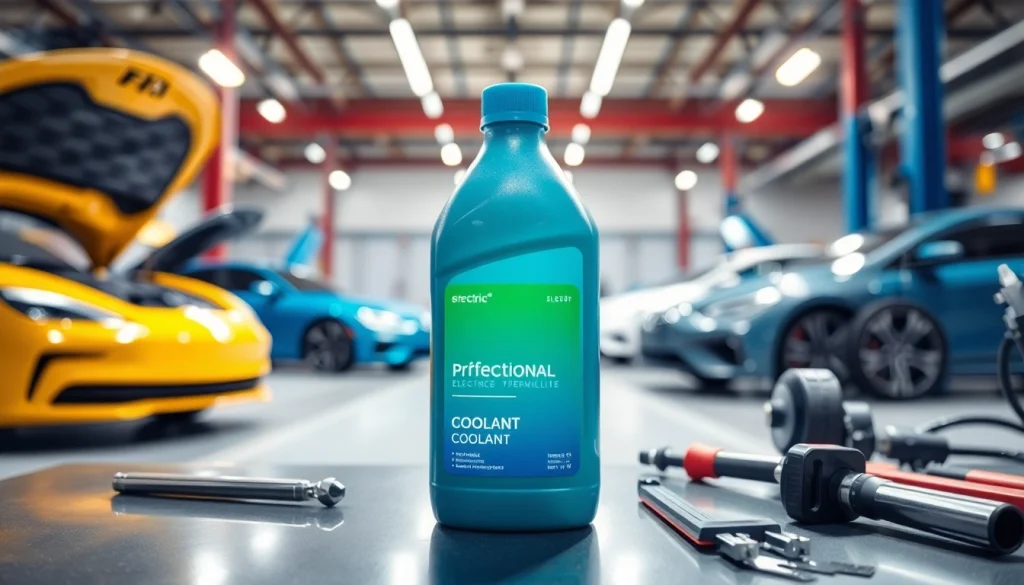Understanding Electric Vehicle Coolant: Types, Benefits, and Maintenance Tips

1. Introduction to Electric Vehicle Coolant
As the automotive industry shifts towards a sustainable future, electric vehicles (EVs) are becoming increasingly prevalent. However, with this advancement comes the necessity for understanding integral components of these vehicles, such as electric vehicle coolant. Coolants play a pivotal role in maintaining optimal operating temperatures for EV batteries and other systems, ensuring efficiency and longevity. This article delves into what electric vehicle coolant is, why it’s critical, and the various types available.
1.1 What is Electric Vehicle Coolant?
Electric vehicle coolant is a specialized fluid designed to maintain the appropriate operating temperature within electric vehicles. Unlike traditional engine coolants used in internal combustion engines, EV coolants serve multiple functions, including heat transfer from the battery, electric motor, and power electronics systems. The right coolant helps avoid overheating, which can damage sensitive components and degrade performance.
1.2 Importance of Coolant in Electric Vehicles
With EVs primarily relying on batteries for power, maintaining an optimal temperature range is crucial. This is because the performance and lifespan of lithium-ion batteries, often used in electric vehicles, are significantly impacted by temperature fluctuations. Overheating can lead to thermal runaway, a catastrophic failure that can damage the battery and compromise safety. Effective coolant management mitigates these risks, ensuring that EVs operate at their best under various conditions.
1.3 Overview of Different Coolant Types
There are several types of coolants used in electric vehicles, each formulated to meet specific requirements. This overview includes water-based coolants, synthetic varieties, and innovative formulations that incorporate various additives. Understanding these differences is essential for selecting the right coolant that meets both manufacturer specifications and performance standards.
2. Types of Electric Vehicle Coolants
2.1 Water-based Coolants
Water-based coolants are the most common type due to their effective thermal conductivity and low cost. Typically composed of a mixture of water and antifreeze, these coolants are effective up to a certain temperature range. One of the key advantages of water-based coolants is their ability to absorb and transfer heat efficiently, making them suitable for various applications. However, they can be corrosive over time, which necessitates the addition of corrosion inhibitors.
2.2 Synthetic Coolants
Synthetic coolants are engineered fluids specifically designed for high-performance environments. They often surpass conventional water-based solutions in terms of thermal stability and provide excellent resistance to freezing and boiling points. Synthetic coolants typically include advanced additives that enhance their properties, making them ideal for high-demand applications found in electric vehicles. However, they can be more expensive compared to traditional options.
2.3 Coolants with Additives
Some coolants are formulated with additional substances that enhance their performance. Additives can include specialized inhibitors to prevent corrosion, foaming agents to maintain stability, and even dyes for leak detection. The incorporation of these additives allows manufacturers to tailor coolants to specific application needs, ensuring optimal performance under varying environmental conditions.
3. Benefits of Using Quality Electric Vehicle Coolants
3.1 Enhanced Thermal Management
One of the most significant benefits of using quality electric vehicle coolants is enhanced thermal management. Proper thermal regulation ensures that components remain within their optimal temperature ranges, preventing overheating and enhancing overall performance. This optimal thermal management extends the lifecycle of crucial components like batteries and electronic systems.
3.2 Corrosion Protection
Electric vehicles operate in a variety of environmental conditions that can accelerate corrosion within cooling systems. High-quality coolants provide corrosion protection by including various additives that form a protective layer on metal surfaces. This significantly reduces the risk of premature system failure due to corrosion, contributing to the vehicle’s overall longevity.
3.3 Improved Longevity of the EV Components
Using a suitable coolant can vastly improve the longevity of electric vehicle components. An effective coolant prevents overheating and minimizes wear on mechanical parts, such as pumps and gaskets. By maintaining system integrity, manufacturers can improve vehicle reliability, ensuring that owners enjoy longer periods between maintenance and fewer breakdowns.
4. Best Practices for Electric Vehicle Coolant Maintenance
4.1 Regular Inspection and Replacement
Routine inspection of the coolant system is vital for maintaining vehicle health. Owners should check coolant levels and quality according to the manufacturer’s recommendations. Over time, coolant degrades and can become contaminated with debris and corrosion products. A regular replacement schedule ensures that the coolant maintains its protective qualities and thermal efficiency.
4.2 Identifying Coolant Leaks
Coolant leaks can lead to significant performance issues. It is crucial to identify leaks early to mitigate damage and costs. Owners should routinely check for any signs of leakage around hoses, pumps, and connections. Typical signs include puddles of fluid under the vehicle or a noticeable drop in coolant levels. If a leak is suspected, addressing it promptly can prevent larger issues down the line.
4.3 Proper Coolant Disposal Methods
When it comes to disposing of used coolant, it’s important to follow environmentally responsible practices. Many states have strict regulations regarding coolant disposal due to its toxic nature. Ensuring that coolant is disposed of properly—through certified recycling centers or automotive service providers—can help protect the environment and prevent contamination of local water supplies.
5. Future Trends in Electric Vehicle Coolants
5.1 Innovations in Coolant Technology
As the EV market continues to grow, so too does research into advanced coolant technologies. Innovations are focusing on developing more efficient and sustainable coolant formulations. These advancements not only aim to improve energy efficiency but also provide better environmental protection by minimizing harmful substances in coolant compositions.
5.2 Eco-friendly Coolant Options
With environmental concerns at the forefront, the development of eco-friendly coolant options has become a priority. Manufacturers are exploring bio-based and biodegradable coolant solutions that provide thermal efficiency without environmental risk. These eco-friendly coolants may help reduce the carbon footprint of electric vehicles while maintaining performance standards.
5.3 Impact on EV Performance and Efficiency
Emerging coolant technologies are expected to significantly impact EV performance and efficiency. Enhanced thermal management capabilities can lead to better battery performance, increased range, and faster charging times. By investing in quality coolant systems, manufacturers and consumers alike can optimize the effectiveness of electric vehicles and ensure they meet the demands of modern driving.






